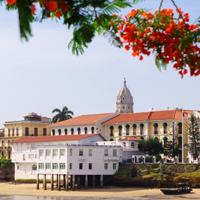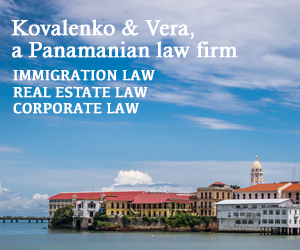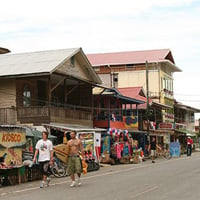Moving to Playa Blanca, Panama
Last updated on Jun 06, 2025
Summary: Moving to Playa Blanca, Panama: Expats, retirees and digital nomads talk about everything you need to know before moving to Playa Blanca.
What do I need to know before moving to Playa Blanca?
When we asked people what advice they would give someone preparing to move to Playa Blanca, they said:
"Playa Blanca is a popular destination for expats due to its beautiful beaches and relaxed lifestyle. Before moving to Playa Blanca, it's important to understand the cost of living, which is generally lower than in the U.S. or Europe, but higher than in other parts of Panama. The official language is Spanish, so learning the language will make daily life and integration into the community easier. However, English is widely spoken in tourist areas and by many locals. The healthcare system in Panama is of a high standard, with many doctors trained in the U.S. or Europe. Private health insurance is recommended for expats, as it provides access to private hospitals and clinics. The climate in Playa Blanca is tropical, with a wet and a dry season. It's hot and humid year-round, so it's important to be prepared for this type of weather. Panama uses the U.S. dollar as its official currency, which can make financial transitions easier for American expats. Panamanian cuisine is a mix of African, Spanish, and Native American techniques, dishes, and ingredients, reflecting its diverse population. Panama has a relatively low crime rate compared to other Latin American countries, but like anywhere, it's important to take precautions and be aware of your surroundings. The country has a friendly and welcoming culture, and family is an important aspect of Panamanian society. Panama's immigration laws are quite friendly towards expats, and there are several visa options available for those wishing to stay long-term. Finally, it's important to note that while Playa Blanca is a beautiful and relaxed place to live, it's also a popular tourist destination, which means it can get busy during peak travel times," explained one expat living in Playa Blanca, Panama.
How do I find a place to live in Playa Blanca?
We asked expats how they chose their neighborhood and found a place to live. They answered:
"Finding a place to live in Playa Blanca involves several steps. First, you need to determine your budget and what type of accommodation you are looking for. This could range from a beachfront villa to a small apartment in the town center. Next, you should research the different neighborhoods in Playa Blanca to find one that suits your lifestyle and preferences. Some areas may be quieter and more residential, while others may be closer to restaurants, shops, and nightlife. Once you have a clear idea of what you're looking for, you can start your search. There are several online real estate platforms that list properties for rent or sale in Playa Blanca, such as Encuentra24 and Compreoalquile. These websites allow you to filter your search based on location, price, property type, and other criteria. In addition to online searches, you may also want to consider hiring a local real estate agent. They can provide valuable insight into the local market, help you negotiate prices, and guide you through the legal process of renting or buying property in Panama. Visiting Playa Blanca in person is also a good idea, if possible. This allows you to view properties firsthand, get a feel for the different neighborhoods, and potentially discover additional housing options that may not be listed online. Finally, once you've found a place you're interested in, make sure to thoroughly review the rental or purchase agreement before signing. If you're not fluent in Spanish, consider hiring a translator or lawyer to ensure you fully understand the terms of the agreement," said one expat who made the move to Playa Blanca.
What is a typical expat home or apartment like in Playa Blanca?
"A typical expat home in Playa Blanca, is often a spacious, modern condominium or villa. These homes are usually located within gated communities, providing a secure environment for residents. They often feature open floor plans, with large windows or glass doors that allow for plenty of natural light and offer stunning views of the surrounding tropical landscape or the ocean. The homes are typically equipped with modern amenities such as air conditioning, high-speed internet, and updated kitchen appliances. Many have private balconies or terraces, and some even have private pools. The interiors are often decorated in a contemporary style, with a mix of local and imported furnishings. The communities where these homes are located often offer additional amenities such as communal pools, fitness centers, and access to nearby beaches. Some even have restaurants, shops, and other conveniences on-site. Despite being in a tropical paradise, these homes offer all the comforts and conveniences of modern living. In terms of location, many expat homes in Playa Blanca are conveniently located close to local attractions, restaurants, and shopping centers. They are also often just a short drive away from the international airport, making it easy for expats to travel to and from their home countries. Overall, a typical expat home in Playa Blanca, Panama, offers a comfortable, luxurious lifestyle in a beautiful, tropical setting," said one expat in Playa Blanca.
What is the average cost of housing in Playa Blanca?
If you are thinking about moving to Playa Blanca, cost of living in probably a key consideration. Expats commented about the cost of housing:
"The average cost of housing in Playa Blanca can vary greatly depending on the type, size, and location of the property. For instance, a luxury beachfront condo can cost significantly more than a small inland home. However, on average, you can expect to pay between $200,000 to $400,000 for a decent-sized property in Playa Blanca. Rental prices can range from $1,000 to $2,000 per month. Please note that these are approximate figures and actual prices may vary," remarked one expat who made the move to Playa Blanca.
Should I buy or rent a home in Playa Blanca?
If you have not spent a lot of time in Playa Blanca, you should rent before even thinking about buying. We asked expats there about the buy vs. rent decision:
"The decision to buy or rent a home in Playa Blanca, largely depends on your personal circumstances, financial situation, and long-term plans. If you plan to stay in Playa Blanca for a long period, buying a home could be a good investment. Owning a property allows you to build equity over time and could provide a potential source of rental income if you decide to lease it out. On the other hand, renting a home in Playa Blanca offers more flexibility. It's a good option if you're not sure how long you'll be staying or if you prefer not to have the responsibilities of home ownership. Renting can also be more affordable in the short term, as it doesn't require a large down payment and ongoing costs like property taxes and maintenance are typically covered by the landlord. It's also important to consider the local real estate market. If property prices in Playa Blanca are high and predicted to rise further, buying a home could be a smart financial move. However, if prices are stagnant or falling, renting might be a safer bet. Lastly, consider your lifestyle preferences. If you value stability and the freedom to personalize your living space, buying a home could be the right choice. If you prefer the flexibility to move easily and don't want the hassle of property maintenance, renting might be more suitable. In conclusion, both buying and renting a home in Playa Blanca, Panama, have their pros and cons. It's crucial to carefully consider your financial situation, long-term plans, and personal preferences before making a decision. Consulting with a real estate professional or financial advisor could also be beneficial," explained one expat living in Playa Blanca, Panama.
What should I pack when moving to Playa Blanca?
We asked people living in Playa Blanca to list three things they wish they had brought and three they wish they had left behind. They responded:
"When moving to Playa Blanca, you should pack lightweight clothing due to the tropical climate. Include items such as shorts, t-shirts, and light dresses. A swimsuit is essential for enjoying the beautiful beaches, and don't forget a hat and sunglasses for sun protection. You should also pack a light rain jacket or umbrella, as Panama has a rainy season. Comfortable walking shoes are a must, as well as sandals or flip flops for the beach. Remember to pack your personal toiletries, although most items can be purchased locally. If you take prescription medication, bring enough to last for your first few months. Pack a Spanish-English dictionary or phrasebook, as not everyone in Panama speaks English. Also, bring important documents such as your passport, driver's license, and any necessary visas or work permits. If you plan on cooking, you might want to pack some of your favorite spices or condiments, as they may not be available in Panama. Lastly, don't forget to pack your electronics, such as your phone, laptop, and chargers. An adapter might be necessary as Panama uses type A and B plugs. Remember, it's always better to pack light and buy what you need locally, as this supports the local economy and can be a fun way to explore your new home," remarked one expat in Playa Blanca, Panama.
 AGS Worldwide Movers
AGS Worldwide MoversGet Quote
Relocating abroad soon? Make your move with AGS! AGS Worldwide Movers is a leader in the international moving industry. Our experience and expertise allows us to guarantee our clients the best quality moving services.
 AGS Worldwide Movers
AGS Worldwide MoversRelocating abroad soon? Make your move with AGS! AGS Worldwide Movers is a leader in the international moving industry. Our experience and expertise allows us to guarantee our clients the best quality moving services.
Get Quote
What cultural faux pas should I try to avoid making in Playa Blanca?
We asked people in Playa Blanca if they could share any humorous cultural blunders they commited. For new expats, keep in mind that these incidents are an inevitable part of expat life. Learning to laugh about them is the key!:
"In Playa Blanca, it's important to respect the local customs and traditions. Avoid making negative comments about the country or its people, as Panamanians are very proud of their heritage and culture. It's considered rude to interrupt someone while they're speaking, so always wait for your turn to talk. Panamanians value punctuality, so try not to be late for appointments or meetings. Avoid discussing sensitive topics such as politics, religion, or personal matters unless you know the person well. Dress modestly, especially when visiting religious sites or rural areas. Do not litter or damage the environment, as Panamanians take pride in their natural surroundings. Avoid public displays of affection, as they are considered inappropriate in Panamanian culture. Do not take photos of people without their permission, as this is considered disrespectful. Always greet people with a handshake and maintain eye contact during conversations, as this is a sign of respect. Avoid using your left hand for gestures or to pass objects, as this is considered impolite. Finally, always say "please" and "thank you", as good manners are highly valued in Panamanian culture," said one expat in Playa Blanca.
About the Author
 Joshua Wood, LPC is one of the Founders of Digital Nomad Exchange and serves as Co-President of Expat Exchange. Prior to Expat Exchange and Digital Nomad Exchange, Joshua worked for NBC Cable (MSNBC and CNBC
Primetime). Joshua has a BA from Syracuse and a Master's in Clinical and Counseling Psychology from Fairleigh Dickinson University. Mr. Wood is also a licensed counselor and psychotherapist.
Joshua Wood, LPC is one of the Founders of Digital Nomad Exchange and serves as Co-President of Expat Exchange. Prior to Expat Exchange and Digital Nomad Exchange, Joshua worked for NBC Cable (MSNBC and CNBC
Primetime). Joshua has a BA from Syracuse and a Master's in Clinical and Counseling Psychology from Fairleigh Dickinson University. Mr. Wood is also a licensed counselor and psychotherapist.
Some of Joshua's articles include Pros and Cons of Living in Portugal, 10 Best Places to Live in Ireland and Pros and Cons of Living in Uruguay. Connect with Joshua on LinkedIn.

We've partnered with Kovalenko & Vera to help with your move.
Learn More
 Kovalenko & Vera Attorneys at Law in Panama
Kovalenko & Vera Attorneys at Law in PanamaWe've partnered with Kovalenko & Vera to help with your move.
Learn More
![]() Panama Forum
Panama Forum
Talk with other digital nomads and expats in Panama on our Panama forum - meet people, get advice and help others.
![]() Contribute
Contribute
Help others in Panama by answering questions about the challenges and adventures of living in Panama.
Digital Nomads in Panama offer advice about healthcare, hospital visits, emergency rooms visits, finding a doctor and buying health insurance in Panama.




